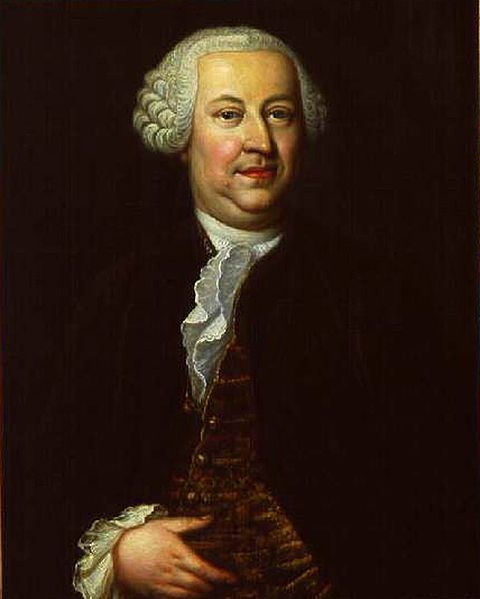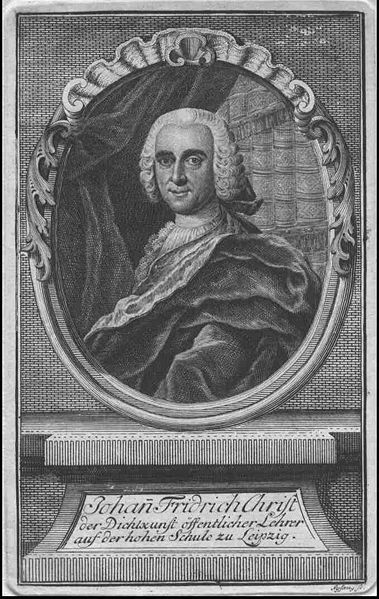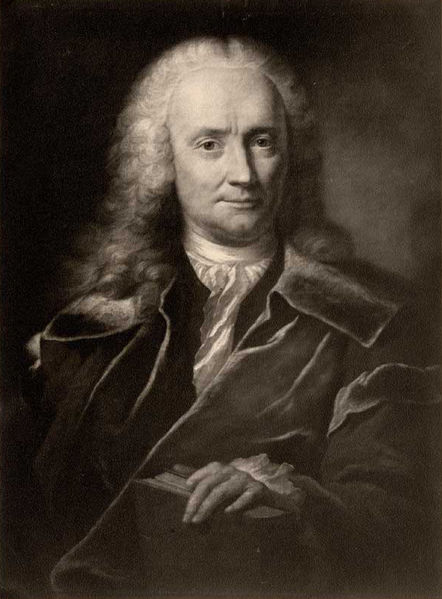<Back to Index>
- Jurist Christian Wilhelm Küstner, 1721
- Archaeologist and Art Historian Johann Friedrich Christ, 1701
- Classicist Johann Matthias Gesner, 1691
PAGE SPONSOR

Christian Wilhelm Küstner (February 13, 1721, Leipzig - February 17, 1785, Leipzig ) was a lawyer and mayor of the city of Leipzig.
Christian Wilhelm Küstner was the son of Leipzig Mayor Gottfried Wilhelm Küstner and his wife Christiane Elisabeth, nee Winkler. After lessons with private tutors, he attended Leipzig's Thomasschule. He then attended the newly founded Georg - August - Universität Göttingen, but returned to Leipzig, in order to study mathematics, philosophy and history. His then pursued legal studies at the University of Wittenberg and continued for a Ph.D. in Law at the University of Leipzig.
In 1747, he was elected to the City Council. During 1763 and 1765 he was appointed deputy mayor. In this capacity, he was recognized for his contributions in overcoming the economic and financial crisis that befell the city as a result of the Seven Years' War. Finally, he was elected as mayor in 1771. This election was followed by six more in the years 1773, 1774, 1776, 1777, 1780 and 1782.
Küstner was elected in 1760 Professor at the Law School, in 1762 he became First Consistory Assessor and in 1772 Assessor of the Law Faculty. From 1760 he was a member of the cathedral chapter to Wurzen and from 1763 to 1768 head of the Thomas School. He was privy Electoral Kammerrat and from 1783 Imperial Hofpfalzgraf.
Christian Wilhelm Küstner was married twice. In 1754 he married Emerentia Charitas Schneider. She was the daughter of pharmacist Christoph Nicolaus Schneider. They had five children. In 1783, he married Dorothea Elisabeth Richter, widow of Thomas Richter, tradesman and advisor to the Saxon Prince-Elector.
Küstner
owned several houses in the town and in 1765 also
purchased the manor Paunsdorf, which he had
leased and used only as a summer residence.

Johann Friedrich Christ (also Johann Heinrich Christ, 26 April 1701, Coburg - September 3, 1756, Leipzig) was a German classical archaeologist and art historian .
Christ began
his training in 1720 at the University of Jena , where
he studied philosophy and law. In 1726 he moved to the
University of Halle and, although he did not yet have
a doctorate, was given permission to hold lectures. In
Halle he decided to pursue the professorship for
history at Leipzig University. He obtained his Ph.D.
Philosophiae Baccalaureus Artium Magister and Bonorum
on February 12, 1728.
The following year he moved to the University of
Leipzig, where he completed his habilitation on June
8th and taught extra ordinem pro loco from August
26th, 1730, a kind of substitute professorship.
Through his writing De Nicolao Machiavello libri tres
(“The three books of Niccolò Machiavelli ”), Christ
gained the interest of his sovereign Augustus the
Strong, who provided him with an extraordinary
position from the Meißen procurator. Christ gave his
inaugural lecture on April 11, 1731 on the duties of
historian. His further promotion was initially delayed
due to his youth: the chairs (full professorships) for
history (Historiarum), Metaphysics (Metaphysices) and
Politics (Moralium ac Politices) were not realized,
although the King of Saxony stood up for him by
rescript. Finally, in 1739, due to his public
reputation, he received the professorship for poetry
(Poeseos) at Leipzig University, whose holder took
over the chair for physics. Christ gave his inaugural
speech about ancient poetry, but his program speech
dealt with art monuments - an unheard-of innovation at
the time. In the following semesters, archeology
continued alongside the history of literature through
Christ's lectures.
At his place
of work in Leipzig, Christ took on numerous university
commitments, as executor, examiner, claviger, several
times dean, chancellor and in the summer semesters
1744, 1748, 1752 and 1756 rector of his Alma Mater.
During his fourth tenure as rector he died of a lung
disease.
Christ is considered to be the founder of academic
archeology classes in Germany, in which he had the
students critically evaluate evidence of ancient art
from his own possession. He did not leave behind a
more extensive literary work, but through his numerous
students he had a noticeable influence on the
development of classical studies in the 18th century.
Among them were not only famous philologists like
Johann Karl Zeune and Friedrich Wolfgang Reiz, but
also writers like Gotthold Ephraim Lessing and
Christian Fürchtegott Gellert .

Johann Matthias Gesner (9 April 1691 - 3 August 1761) was a German classical scholar and schoolmaster.
He was born at Roth an der Rednitz near Ansbach. His father, Johann Samuel Gesner, a pastor in Auhausen, died in 1704, leaving the family in straitened circumstances. Gesner's mother, Maria Magdalena (born Hußwedel), remarried, and Johann Matthias's stepfather, Johann Zuckermantel, proved supportive. Noticing the boy's gifts, he prepared him for the Ansbach Gymnasium. Since the costs of the school surpassed the family's means, the boy was supported by public resources and spent his school years in a dwelling for poor students; he was given special attention and instruction by the rector of the Gymnasium, Georg Nikolaus Köhler, who sparked his interest in languages, loaned him Greek texts, and devised special exercises in which the boy had to reconstruct intelligible texts from fragments. Gesner later called his Gymnasium years the most pleasant in his life.
He went on to study metaphysics, Semitic languages, and classical literature as a theology student at the University of Jena, working under Johann Franz Buddeus, who befriended Gesner and allowed the student to live in his own house. Despite Buddeus's support, however, he passed up for a position in Jena. In 1714 he published a work on the Philopatiis ascribed to Lucian. In 1715 he became librarian and vice principal at Weimar, where he became good friends with Johann Sebastian Bach (Bach later dedicated his Canon a 2 perpetuus BWV 1075 to Gesner), in 1729 (having been dismissed as librarian at Weimar) rector of the gymnasium at Ansbach, and in 1730 rector of the Thomasschule at Leipzig. The faculty at the University of Leipzig refused Gesner teaching privileges, however, and on the foundation of the University of Göttingen he became Professor of Poetry and Eloquence (1734) and subsequently librarian, continuing to publish works on classical languages and literature as well composing Latin poetry and publicizing the university. Having probably become familiar with a similar organization in Leipzig, in 1738 he founded the Deutsche Gesellschaft, devoted to the advancement of German literature. He died at Göttingen.
Gesner won a wide reputation as a reformer, a scholar, and a humanist.